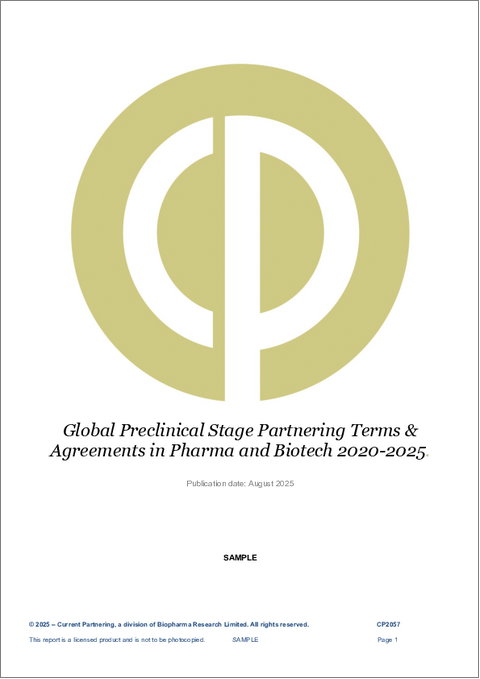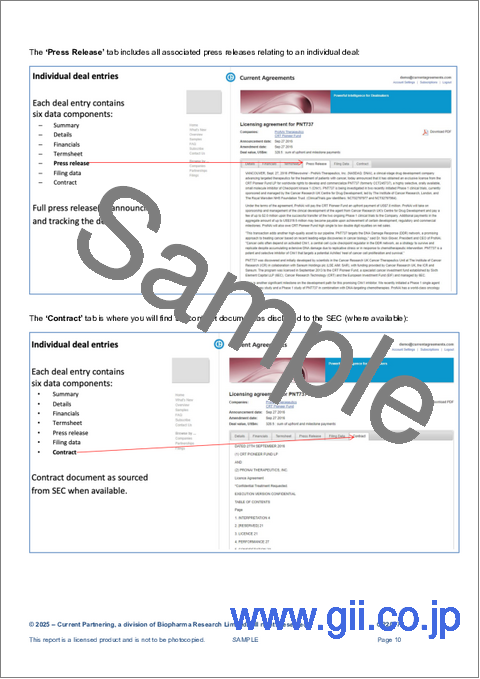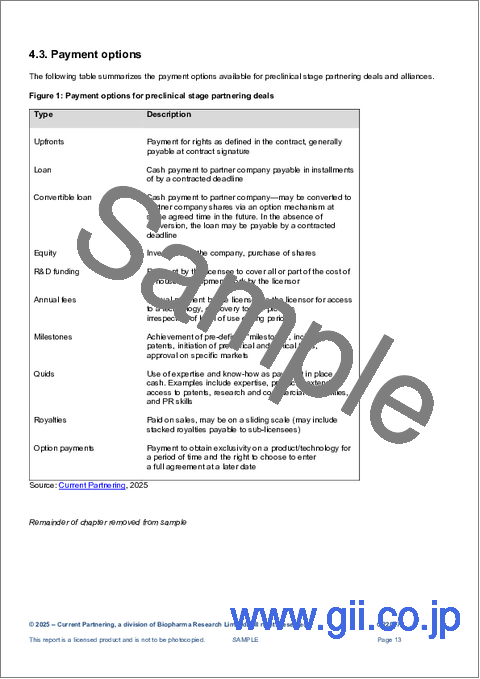|
|
市場調査レポート
商品コード
1795399
製薬・バイオテクノロジーにおける前臨床段階の提携条件と契約(2020年~2025年)Preclinical Stage Partnering Terms and Agreements in Pharma and Biotech 2020-2025 |
||||||
適宜更新あり
|
|||||||
| 製薬・バイオテクノロジーにおける前臨床段階の提携条件と契約(2020年~2025年) |
|
出版日: 2025年08月01日
発行: Current Partnering
ページ情報: 英文 1500+ Pages
納期: 即日から翌営業日
|
全表示
- 概要
- 目次
当レポートでは、製薬・バイオテクノロジー業界について調査分析し、企業が前臨床段階の提携契約を締結する方法と理由、これらの提携を形成する主な財務的・戦略的条件に関する、包括的なデータ主導の分析を提供しています。
目次
エグゼクティブサマリー
第1章 イントロダクション
第2章 企業が前臨床段階の化合物を提携する理由
- イントロダクション
- 前臨床段階のパートナーシップの役割
- 前臨床段階でのライセンス導入
- 前臨床段階でのライセンス供与
- 探索段階、前臨床段階、臨床段階の契約の違い
- 前臨床段階の提携契約を締結する理由
- ライセンサーが前臨床段階の契約に参入する理由
- ライセンシーが前臨床段階の契約に参入する理由
- 前臨床段階の提携契約の将来
第3章 前臨床段階の契約戦略と構造
- イントロダクション
- 企業はどの段階で提携するか
- 製薬/バイオテクノロジーにおける早期の提携
- 製薬/バイオテクノロジーにおける晩期の提携
- 初期段階と後期段階の提携 - リスクとコストの比較
- 企業は前臨床段階の提携にいくら費やしているか
- 純粋/多成分の提携契約
- 純粋なライセンシング契約の構造
- 純粋前臨床段階のライセンシング契約の例
- a. ケーススタディ9
- b. ケーススタディ10
- 多成分前臨床段階の提携契約
- 多成分前臨床段階条項の例
- a. ケーススタディ11
- b. ケーススタディ12
第4章 前臨床段階の提携の決済戦略
- イントロダクション
- 前臨床段階の決済戦略
- 決済方法
- ヘッドライン金額
- 前払い
- ローン
- 転換ローン
- 公平性
- 研究開発資金
- ライセンシング料
- マイルストーン払い
- ロイヤルティ率
- クイッズ
- オプション決済
第5章 前臨床段階の契約の動向
- イントロダクション
- 年間の前臨床段階の提携
- 前臨床契約の属性
- 前臨床段階の提携:契約タイプ別
- 前臨床段階の提携:疾患タイプ別
- 前臨床段階の提携:技術タイプ別
- もっとも活発な企業による前臨床段階の提携(2020年~)
第6章 前臨床段階の提携における決済条件
- イントロダクション
- 前臨床段階の決済条件に関するガイドライン
- 前払い
- マイルストーン払い
- ロイヤルティ払い
- 前臨床段階の決済条件 - 契約データの分析
- 公開データ
- 調査データ
- 決済条件分析
- 前臨床段階のヘッドライン金額
- 前臨床段階の契約の前払い
- 前臨床段階の契約のマイルストーン払い
- 前臨床段階のロイヤルティ率
第7章 前主な臨床段階の契約
- イントロダクション
- 前臨床段階の上位契約(金額)
第8章 もっとも活発な前臨床段階の契約企業上位25社
- イントロダクション
- もっとも活発な前臨床段階の契約企業上位25社
第9章 前臨床段階の提携契約ディレクトリ
- イントロダクション
- 前臨床段階の契約(2020年~)
第10章 前臨床段階の契約:開発段階別
- イントロダクション
- 契約:前臨床段階別
付録
Preclinical Stage Partnering Terms and Agreements in Pharma and Biotech (2020-2025)
The Preclinical Stage Partnering Terms and Agreements in Pharma and Biotech 2020-2025 report provides a comprehensive, data-driven analysis of how and why companies enter preclinical-stage partnering agreements, as well as the key financial and strategic terms shaping these partnerships. This essential industry resource delivers unparalleled insights into the structure, negotiation dynamics, and financial considerations that define early-stage pharmaceutical and biotech collaborations.
At the preclinical stage, licensing agreements typically grant the licensee exclusive rights or options to develop a licensor's drug candidate or technology. These agreements are often multifaceted, beginning with collaborative R&D efforts and potentially culminating in commercialization agreements.
This report provides detailed intelligence on the latest preclinical-stage agreements in the healthcare sector, helping companies evaluate market trends, optimize negotiation strategies, and benchmark deal structures.
A Must-Have Resource for Biotech and Pharma Dealmakers
The Preclinical Stage Partnering Terms and Agreements in Pharma and Biotech (2020-2025) report is an indispensable resource for business development, legal, and financial professionals involved in biopharma dealmaking.
With comprehensive insights, a vast deal database, and direct access to contract documents, this report serves as the ultimate tool for:
- Benchmarking deal structures and financial terms
- Optimizing negotiation strategies
- Assessing potential partners' flexibility
- Identifying trends in preclinical-stage partnerships
- Why This Report is Essential for Dealmakers
- Understanding a potential partner's negotiation flexibility and deal structures is critical when entering preclinical-stage partnerships. While headline financial figures (e.g., upfront payments, milestones, royalties) are important, contract documents reveal the precise triggers and conditions for these payments-details that are often missing from press releases and traditional deal databases.
- This report provides a comprehensive listing of over 1,670 preclinical-stage deals announced since 2020, including financial terms where available. Additionally, it includes direct links to online deal records, along with publicly available contract documents submitted to the SEC.
- By analyzing these agreements, companies can gain critical insights to refine deal strategies, assess partner flexibility, and structure competitive agreements.
- Comprehensive Analysis of Preclinical-Stage Partnering Trends
The first chapters of this report offer a detailed orientation to preclinical-stage deal-making, including:
Chapter 1 - Introduction to the report
Chapter 2 - Why companies engage in preclinical-stage partnerships
Chapter 3 - Strategic approaches and deal structures, with case studies
Chapter 4 - Payment strategies, including upfronts, milestones, and royalties
Chapter 5 - Analysis of preclinical-stage deal activity (2020-2025), categorized by year, stage of development, therapeutic area, technology type, and key dealmakers
Chapter 6 - In-depth financial analysis of headline values, upfront payments, milestone triggers, and royalty rates
Chapter 7 - A review of the leading preclinical-stage deals by headline value
Chapter 8 - Profiles of the top 25 most active preclinical-stage dealmakers
Chapter 9 - A database of preclinical-stage partnering agreements, including contract documents where available
Chapter 10 - A comprehensive directory of all preclinical-stage deals announced since 2020
- Key Benefits of the Report
This must-have industry resource provides exclusive insights to help companies assess, structure, and negotiate their own preclinical-stage partnerships. Key benefits include:
- Time-Saving Market Intelligence - Eliminate the need for manual research with ready-to-use insights on industry trends and deal structures.
- Unmatched Financial Data Access - Gain exclusive insight into headline values, upfront payments, milestone structures, and royalty terms to optimize negotiations.
- Comprehensive Deal Database - Access over 1,670 preclinical-stage agreements, including contract documents where available.
- Deep-Dive into Industry Leaders - Analyze actual preclinical-stage deals entered into by the top 25 global pharma and biotech companies, alongside emerging players.
- Strategic Case Studies & Deal Analysis - Examine real-world deal structures and negotiation strategies to enhance your own business development approach.
- High-Value Deal Identification - Pinpoint the most lucrative preclinical-stage deals signed since 2020, gaining insight into premium industry transactions.
- Profile the Most Active Dealmakers - Identify key players driving preclinical-stage collaborations, ensuring you engage with the right partners.
- Full Deal Listings & Categorization - Navigate a complete A-Z listing of preclinical-stage agreements, categorized by company, development phase, deal type, therapeutic area, and technology focus.
- Negotiate with Confidence - Understand the key terms and conditions agreed upon in previous deals, helping you structure optimal agreements.
- Robust Due Diligence Support - Conduct data-backed assessments to determine the viability and competitiveness of your proposed deal terms.
- Scope of the Report
The Preclinical Stage Partnering Terms and Agreements in Pharma and Biotech (2020-2025) report provides:
- Trends in preclinical-stage dealmaking in the biopharma industry since 2020
- Detailed deal structures, including upfront, milestone, and royalty terms
- Case studies of real-life preclinical-stage agreements
- Access to over 1,670 preclinical-stage deals, with contract records where available
- Profiles of the most active preclinical-stage dealmakers since 2020
- Analysis of the highest-value preclinical-stage deals
Each deal record is indexed by:
- Company (A-Z)
- Headline Value
- Deal Type
- Specific Therapy Focus
- Technology Focus
- Critical Questions Answered
By analyzing actual contract agreements where available, this report provides definitive answers to critical questions such as:
- What specific rights are granted in each agreement?
- What exclusivity terms apply?
- How is the deal structured financially? (Upfronts, milestones, royalties)
- Who controls development, manufacturing, and commercialization?
- How are intellectual property rights handled?
- What are the termination conditions for the agreement?
- What dispute resolution mechanisms are in place?
- How are confidentiality and publication rights managed?
Table of Contents
Executive Summary
Chapter 1 - Introduction
Chapter 2 - Why do companies partner preclinical stage compounds?
- 2.1. Introduction
- 2.2. The role of preclinical stage partnering
- 2.2.1. In-licensing at preclinical stage
- 2.2.2. Out-licensing at preclinical stage
- 2.3. Difference between discovery, preclinical and clinical stage deals
- 2.4. Reasons for entering into preclinical stage partnering deals
- 2.4.1. Licensors reasons for entering preclinical stage deals
- 2.4.2. Licensees reasons for entering preclinical stage deals
- 2.5. The future of preclinical stage partnering deals
Chapter 3 - Preclinical stage deal strategies and structure
- 3.1. Introduction
- 3.2. At what stage do companies partner?
- 3.2.1. Partnering early in pharmaceutical / biotech
- 3.2.1.1. Discovery and preclinical stage partnering case studies
- 3.2.1.1.a. Case study 1
- 3.2.1.1.b. Case study 2
- 3.2.1.1.c. Case study 3
- 3.2.1.1.d. Case study 4
- 3.2.2. Partnering later in pharmaceutical/biotech
- 3.2.2.1. Clinical stage partnering case studies
- 3.2.2.1.a. Case study 5
- 3.2.2.1.b. Case study 6
- 3.2.2.1.c. Case study 7
- 3.2.2.1.d. Case study 8
- 3.3. Early and later stage partnering - a risk/cost comparison
- 3.4. What do companies spend on preclinical stage partnering?
- 3.5. Pure versus multi-component partnering deals
- 3.6. Pure licensing agreement structure
- 3.6.1. Example pure preclinical stage licensing agreements
- 3.6.1.a. Case study 9
- 3.6.1.b. Case study 10
- 3.7. Multicomponent preclinical stage partnering agreements
- 3.7.1. Example multicomponent preclinical stage clauses
- 3.7.1.a. Case study 11
- 3.7.1.b. Case study 12
Chapter 4 - Preclinical stage partnering payment strategies
- 4.1. Introduction
- 4.2. Preclinical stage payment strategies
- 4.3. Payment options
- 4.3.1. Headline values
- 4.3.2. Upfront payments
- 4.3.2.1. Conditionality of upfront payments
- 4.3.3. Loans
- 4.3.4. Convertible loans
- 4.3.5. Equity
- 4.3.6. R&D funding
- 4.3.7. Licensing fees
- 4.3.8. Milestone payments
- 4.3.9. Royalty payments
- 4.3.9.1. Issues affecting royalty rates
- 4.3.9.2. Royalties on combination products
- 4.3.9.2.a. Case study 13
- 4.3.9.3. Guaranteed minimum/maximum annual payments
- 4.3.9.4. Royalty stacking
- 4.3.9.5. Royalties and supply/purchase contracts
- 4.3.10. Quids
- 4.3.11. Option payments
Chapter 5 - Trends in preclinical stage deal making
- 5.1. Introduction
- 5.2. Preclinical stage partnering over the year
- 5.2.1. Attributes of preclinical deals
- 5.3. Preclinical stage partnering by deal type
- 5.4. Preclinical stage partnering by disease type
- 5.5. Partnering by preclinical stage technology type
- 5.6. Preclinical stage partnering by most active company, 2020 - 2025
Chapter 6 - Payment terms for preclinical stage partnering
- 6.1. Introduction
- 6.2. Guidelines for preclinical stage payment terms
- 6.2.1. Upfront payments
- 6.2.2. Milestone payments
- 6.2.3. Royalty payments
- 6.3. Preclinical stage payment terms - deal data analysis
- 6.3.1. Public data
- 6.3.2. Survey data
- 6.4. Payment terms analysis
- 6.4.1. Preclinical stage headline values
- 6.4.2. Preclinical stage deal upfront payments
- 6.4.3. Preclinical stage deal milestone payments
- 6.4.4. Preclinical stage royalty rates
Chapter 7 - Leading preclinical stage deals
- 7.1. Introduction
- 7.2. Top preclinical stage deals by value
Chapter 8 - Top 25 most active preclinical stage dealmakers
- 8.1. Introduction
- 8.2. Top 25 most active preclinical stage dealmakers
Chapter 9 - Preclinical stage partnering contracts directory
- 9.1. Introduction
- 9.2. Preclinical stage deals with contracts 2020 - 2025
Chapter 10 - Preclinical stage deal making by development stage
- 10.1. Introduction
- 10.2. Deals by preclinical stage
Appendices
- Appendix 1 - Preclinical stage dealmaking by companies A-Z
- Appendix 2 - Preclinical stage dealmaking by industry sector
- Appendix 3 - Preclinical stage dealmaking by stage of development
- Appendix 4 - Preclinical stage dealmaking by therapy area
- Appendix 5 - Preclinical stage dealmaking by technology type
- About Biopharma Research Ltd
- Current Partnering
- Current Agreements
- Recent titles from Current Partnering
Table of figures
- Figure 1: Definition of discovery, preclinical and clinical phases in dealmaking
- Figure 2: Components of the pure licensing deal structure
- Figure 3: Payment options for preclinical stage partnering deals
- Figure 4: Issues affecting royalty rates
- Figure 5: Preclinical stage partnering frequency 2020 - 2025
- Figure 6: Preclinical stage partnering by deal type since 2020
- Figure 7: Preclinical stage partnering by disease type since 2020
- Figure 8: Preclinical stage partnering by technology type since 2020
- Figure 9: Top 25 most active preclinical stage dealmakers, 2020 - 2025
- Figure 10: Review of upfront payments for preclinical stage deals
- Figure 11: Review of milestone payments for preclinical stage deals
- Figure 12: Review of royalty payments for preclinical stage deals
- Figure 13: Preclinical stage deals with a headline value
- Figure 14: Preclinical stage deals with an upfront value
- Figure 15: Preclinical stage deals with a milestone value
- Figure 16: Preclinical stage deals with a royalty rate value
- Figure 17: Top preclinical stage deals by value since 2020
- Figure 18: Most active preclinical stage dealmakers 2020 - 2025






